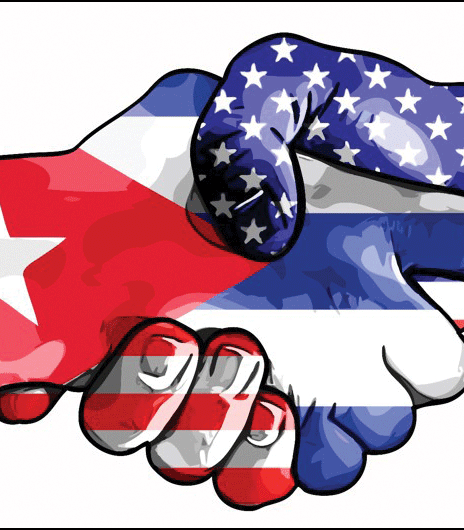What’s Left, Being Right: United States and the “Cuban Thaw”

SOLID NEGOTIATIONS: Changes in U.S.–Cuba relations have been positively received by many Americans, particularly democrats.
What’s Left
End of a Long Winter
by James Goldin
Cuba and the U.S. have had what can best be summarized as a tense relationship for the past five decades due to the failure of the U.S.-backed Bay of Pigs invasion. After 54 years of high tension, economic embargo and general pettiness, a new era of U.S.–Cuban relationships is being ushered in.
The “Cuban Thaw,” as it has been called by the media, first started on December 17, 2014, when President Barack Obama and Cuban President Raúl Castro announced the beginning of a process devoted to the normalization of relations between Cuba and the United States. These negotiations finally came to fruition after secret meetings in Canada and the Vatican City (in which Pope Francis played a key role). Key reforms would include a lifting of travel restrictions, implementation of embassies in both country, and access between Cuba’s and the U.S. financial system. These changes are and should be welcome by a majority of both sides’ populations.
However, some Republicans complain that the U.S. should not be “soft” on Cuba and should keep the 1960s policies. No good can come from keeping these old policies; the new agreement creates more tourism, contributes to more cordial relationships between Cuba and the U.S. and reduces need for conflict between two neighboring nations. It’s understandable for some people to be wary of the Cuba-U.S. relationship, especially those born in the decades where it wasn’t uncommon to indoctrinate children with the belief that everything Communism – and by extension Cuba – stood for was against the U.S. However, it is time to put these inherently flawed and obsolete viewpoints back in the past where they belong. It’s been half a century since the Bay of Pigs invasion; it’s time to move into the modern global age and reconcile political differences.
One of the most outspoken critics of the Cuban Thaw is Senator Marco Rubio. I think the best rebuttal of his viewpoint comes from Republican Rand Paul, who said, “Senator Rubio is acting like an isolationist […] The 50-year embargo just hasn’t worked. If the goal is regime change, it sure doesn’t seem to be working.”
Rubio is simply worried about a greater Cuban influence in his state of Florida that would most likely vote Democrat. Isolationism to an extent that refuses to have even basic relations with a nation 90 miles away is a flawed and backwards philosophy that only becomes more foolish and impractical in an increasingly globalized world.
A majority of Americans have welcomed the change. Most Americans recognize the need to fix this diplomatic issue that has plagued the two nations for far too long. The Republicans that claim a loss of America’s “moral superiority” compared to Cuba or that America’s going “soft” need to take a hard look at the illogical and frankly dangerous aspects of their viewpoint. They need to realize the need for compromise, which – as most politicians seem to forget – is the basis for all politics.
Being Right
Freedoms of Corporations
by Olivia Detato
On April 11, President Obama met with Cuban dictator Raul Castro at the Regional Summit of the Americas in Panama. It had been more than 50 years since leaders of the two nations had talked face-to-face.
In response to the hour-long meeting, the President was quoted saying that he hopes to end “a rigid policy that’s rooted in events that took place before most of us were born.” Currently, Latin American approval for the President is high and instead of the usual snub that the United States received at the Summit of the Americas in the past, President Obama was awarded with a few nods. Moving forward, an open relationship with Cuba will open new doors for future influence in Latin America.
The President promised Castro swift action in removing Cuba from the terrorism watch list. Currently, Cuba still remains on the list of countries that sponsor terrorism, but as of April 15, the White House stated that the President is planning on removing Cuba from this list. The President has recently submitted the necessary proposal for Congressional review. He also plans to work towards reopening embassies in Havana and Washington.
Despite smiles and handshakes, not all tensions were eased. At the Summit, Castro made less than favorable remarks regarding U.S. foreign policy concerning Cuba and Guantanamo Bay. He claimed that a working relationship with the United States would require patience.
The Cold War has long ended and it is clear that the United States is ready for new diplomacy, but is this really the right diplomacy? I applaud the President for his efforts to make amends, but opening talks with Cuba will not eliminate the animosity that still runs deep from the Cold War era. This fact is clear by speech that Castro gave at the Summit.
I question President Obama’s stance on human rights and the manner in which he esteems democracy. It is clear to the American people that his words and actions are nothing short of contradictory. Outlawing torture of war criminals and then opening discussion with an oppressive dictatorship go hand-in-hand for only President Obama.
Furthermore, Cuba has publicly supported plans for nuclear development in Iran and has even developed relations with China and Russia. Cuba has additionally been known to aid terrorists and to provide shelter to those wanted in the United States.
President Obama made a statement to respond to public hesitations regarding U.S. policy in which he said that in the future the United States will continue to push Cuba in the direction of more human rights, democracy and freedom of the press, yet I don’t see that making any impact. Cuba isn’t going to do an about-face, throw old regimes to the wind and adopt new democratic principles anytime soon.
So the question still remains: why has the President all of a sudden taken such a seemingly amicable stance toward Cuba? I can’t help but be skeptical of the President’s intentions. During the earlier years of the Obama administration Cuba was not on the horizon. Again it appears that the President is more concerned with building a memorable legacy than doing what is best for the country as a whole.
After the past 6 and a half years of shaky foreign diplomacy, President Obama is bandaging the wound in an attempt to forge lasting diplomatic relations. On a similar note, I see the President’s actions as an attempt to garner Hispanic and Latin American votes for the Democratic party in the upcoming 2016 election. It is clear that the norm of sycophantic pandering to the masses perpetuated by the Obama administration will continue to the definitive end of the term.








